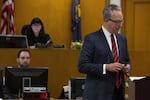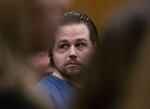A Multnomah County prosecutor used security camera images and witness statements Tuesday to offer jurors a gruesome, gripping account of the stabbing deaths of two men on a light-rail train in Portland in May 2017.
Chief Deputy District Attorney Don Rees used his opening argument to tell jurors that defendant Jeremy Christian triggered the bloody few moments by yelling hateful things at two African American girls and then shoving a man who tried to position himself between them.
Taliesin Myrddin Namkai-Meche, 23, and Ricky Best, 53, died in the May 26, 2017, attacks, and another man, Micah Fletcher, was seriously injured. Rees said the stabbing lasted just 12 seconds.

Chief Deputy District Attorney Don Rees presents opening statements in the case against Jeremy Christian.
Beth Nakamura / The Oregonian/OregonLive/Pool
Christian faces a dozen charges, including murder. His attitude in the early stages of the trial has been defiant toward the criminal justice system and matter-of-fact about the crimes he’s charged with committing. He’s shown up each day in his blue jail scrubs, declining a judge’s repeated reminders that he’s allowed to wear civilian clothes.
As he walked into court Tuesday morning, he asked a question of the packed courtroom: “You guys ready to smash Portland’s fairy tale?”
In his hourlong opening, Rees told jurors that Christian went on a hate-filled rant that day in 2017 directed at two young African American women — Destinee Mangum and Walia Mohamed, the latter wearing a hijab. They were 12 feet from Christian as he yelled at them, Rees told jurors.
The girls moved to get farther away, and two men — Shawn Forde and later Fletcher — intervened, trying to stay between Christian and the girls.
Using screenshots from security camera footage to illustrate his narrative, Rees stressed that the first use of force on the train came when Christian shoved Fletcher. Christian and his defense team have suggested Christian was acting in self-defense.
“No one saw this happen,” Rees said of the defense’s version of events.
Fletcher shoved Christian in response, and Christian, who was standing, fell back into a seat, Rees said. Christian pulled out a knife, the prosecutor said, and stabbed Fletcher.
“The knife he’s carrying opens with the flick of the wrist,” Rees said. “You don’t need two hands to open this knife.” Rees said Christian stabbed Fletcher, then Namkai-Meche. He continued slashing at all three men.
After his arrest, Rees said, Christian talked about what he’d done: “‘That’s right, this is a hate crime,’” the prosecutor quoted Christian as telling police. “‘I hope they all die. I’m a patriot. I hope they all die.’”
Dean Smith, one of Christian’s defense attorneys, used many of the same images as the prosecution to walk the jury through the timeline of the stabbings. He told jurors that Christian was acting in self-defense and exercising his free speech rights.

Opening arguments began Tuesday on the first day of the Jeremy Christian trial at Multnomah County Courthouse in Portland, Oregon. Jan. 28, 2020.
Beth Nakamura / The Oregonian/OregonLive/Pool
“Mr. Christian was not the initial aggressor,” Smith said. Smith argued that Namkai-Meche and Fletcher first approached Christian and began arguing with him.
Smith also told jurors that they will need to decide if Christian was indeed targeting the two young women in his rant.
"Mr. Christian’s words were most certainly provocative,” Smith said. But, the defense lawyer continued, “there’s no evidence that he even noticed them. He does not address them.”
Smith said the two teenagers did not move from their seats when Christian was yelling near them, but rather when Fletcher walked up to Christian.
“Notice the expressions,” Smith said, referring to an image of the young women smiling on the bus after they had moved away from the yelling. “They’ve removed themselves from Mr. Christian. They’re seated there talking with each other. When they have smiles and they’re laughing ... you can have a sense of how they’re dealing with this rant.”
Smith continued to say that Christian was only focused on the men confronting him, not anyone else on the MAX.
“The only people who were injured were the three men who were confronting Mr. Christian and attempting to throw him off the train,” Smith said. “This wasn’t some wild killing spree generally on the MAX that day.”
Smith quickly ran through Christian’s history of exercising his free speech right — such as going to political rallies and publishing outspoken social media posts.
Related: Friends, Experts Say Lack Of Mental Health Care Made Portland 2017 MAX Stabbings More Likely
Smith also briefly spoke about Christian’s mental state, saying a doctor would be testifying during the trial about Christian’s fight-or-flight response and his thought process on the MAX.
Following opening arguments, the prosecution called its first witness Tuesday afternoon, Zhada Allen, a young black woman who was also on the MAX Green Line train the day of the stabbings.
Allen recalled entering the train and said she heard Christian yelling: “He was screaming a lot of things, but one of the things that stood out was ‘free speech or die,’” Allen said. “It made me feel uncomfortable and unsafe. It made me feel like he was attacking me and others around me.”
Jurors watched a video Allen recorded on her phone, including the moments that Fletcher and Namkai-Meche were stabbed by Christian. The video cuts out shortly after those stabbings, and Allen said she ran off of the train with the other two young black women.
“I ran for my life … because I didn’t know who he was going to come for next,” Allen said.
Walia Mohamed, the young black woman who was wearing a hijab when Christian began yelling, also testified Tuesday and told jurors what she heard Christian scream.
“He was saying ‘Fuck Muslims,’ ‘Go back to Saudi Arabia,’” Mohamed said, breaking into tears. “He was saying ‘Kill yourself.’”
She said she was scared.
“I’ve never experienced any racism towards me or anything he was saying,” said Mohamed, now 20. “I’d just never experienced it.”
She said she has post-traumatic stress disorder from the events on the train.
“It’s like reliving it every day,” Mohamed said.
The other young woman on the train, Destinee Mangum, also testified Tuesday about what she experienced.
“He just had a bad look in his eye,” Mangum said of Christian, who she noticed when she and Mohamed got on the MAX.
She recalled him saying something along the lines of “Nazis are not bad people,” she said.
“I was just scared because I had never experienced that before. I’d never been in a situation like that,” said Mangum, 18. “I always learned about it in school, about racism and stuff, but I’d never been discriminated against by someone.”
Prosecutors also played a video recorded on Mangum’s phone, which shows the moments leading up to the stabbings and Mangum and Mohamed running off the train, screaming. Mangum said she and Mohamed felt Christian was “coming to finish the job.”
Mangum said she, Mohamed and Allen ran together to a nearby 24 Hour Fitness, where they locked themselves in a locker room stall.
“To just come at girls who are just going about their day, I just feel like he wasn’t even in his right mind to do that,” Mangum said of Christian.
One of Christian’s defense attorneys, Smith, suggested to Mangum that Christian’s remarks may not have been specifically aimed at Muslims. He noted that Christian also talked about other religions.
Mangum agreed, but said Christian was focused on her and Mohamed.
“When he first got on and was talking about Muslims and Jews,” Mangum said, “[Christian] was staring right at us.”
Witness testimony is set to continue Wednesday morning.